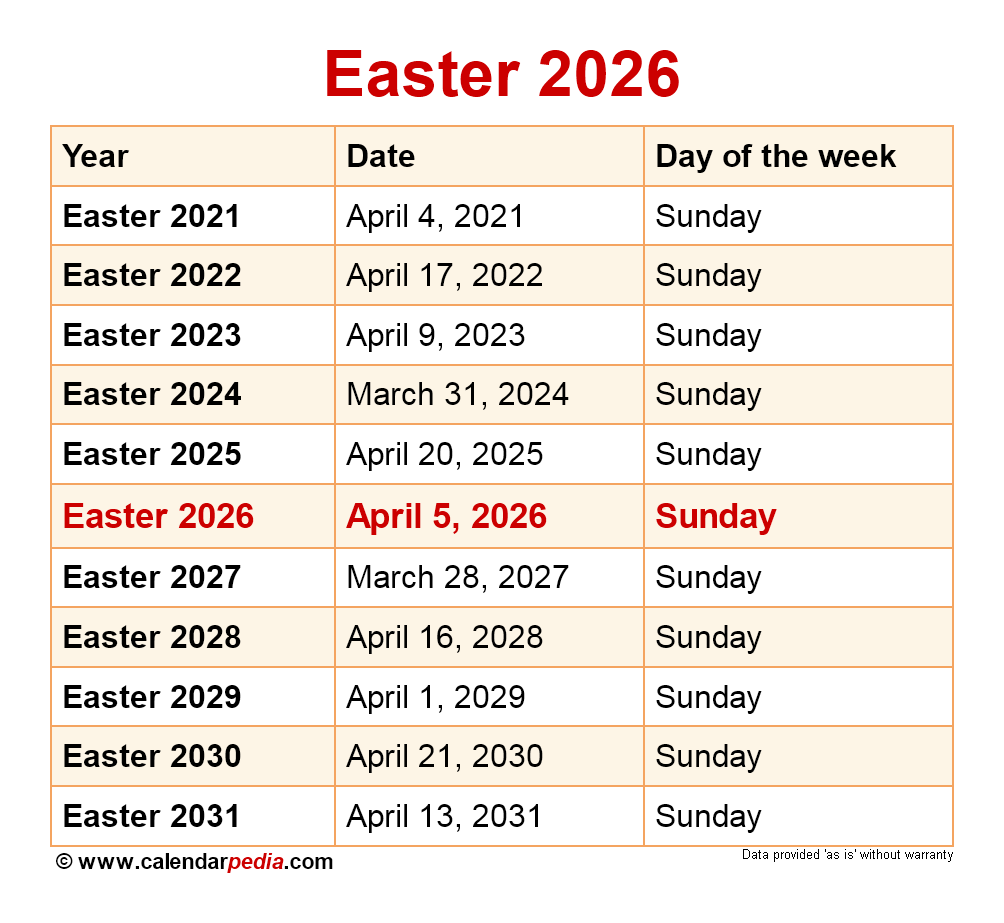Understanding The Significance Of Easter Dates
Easter is a time of celebration, reflection, and renewal, observed by millions around the world. With its rich history and diverse traditions, the dates of Easter can vary significantly each year, making it a topic of interest for many. As we delve into the various aspects of Easter, we will explore what Easter dates are, how they are determined, and the significance they hold in the Christian faith.
From the joyous Easter egg hunts to the solemn observances of Holy Week, the dates associated with Easter play a crucial role in how communities celebrate this important holiday. Understanding what Easter dates are can help individuals and families plan their festivities, attend church services, and engage in meaningful traditions. Moreover, the evolving nature of Easter dates throughout history adds depth to its significance, inviting a closer look at its origins and evolution over time.
In this article, we will answer several key questions regarding what Easter dates are and how they impact the way we celebrate this beloved holiday. From the formulas used to determine the dates to the various customs associated with the day, we will uncover the layers of meaning behind Easter dates and their influence on cultures around the globe.
What Are Easter Dates and How Are They Determined?
Easter dates are not fixed and can vary widely from year to year. The primary reason for this variation lies in the fact that Easter is celebrated on the first Sunday following the full moon that occurs on or after the vernal equinox. This means that Easter can be celebrated as early as March 22 and as late as April 25. This method of calculating Easter dates was established by the Council of Nicaea in 325 AD, and it has remained largely unchanged since then.
Why Does the Date of Easter Change Each Year?
The changing date of Easter stems from its dependence on lunar cycles rather than the solar calendar that most of the Western world follows. This can make it challenging for individuals to keep track of when Easter will occur each year. The Church aims to maintain a connection between the celebration of Easter and the Jewish Passover, which is also based on the lunar calendar. This connection is significant as it aligns the resurrection of Jesus with the themes of renewal and rebirth that are central to both celebrations.
How Do Different Christian Denominations Celebrate Easter Dates?
Various Christian denominations often celebrate Easter on different dates due to differences in calendar systems. While most Western Christian churches follow the Gregorian calendar, some Eastern Orthodox churches use the Julian calendar, leading to different observance dates. This can result in celebrations occurring on the same day or several weeks apart.
What Are Easter Dates for the Upcoming Years?
To help plan your Easter celebrations, here are the upcoming Easter dates for the next few years:
- 2024: March 31
- 2025: April 20
- 2026: April 5
- 2027: March 28
- 2028: April 16
Why Are Easter Dates Important to Christians?
Easter dates hold profound significance for Christians, as they mark the resurrection of Jesus Christ, a cornerstone of the Christian faith. This event symbolizes victory over sin and death, and it is a time for Christians to reflect on their faith and renew their commitment to their beliefs. The celebration of Easter is often accompanied by special church services, feasts, and family gatherings, making the dates even more meaningful.
What Traditions Are Associated with Easter Dates?
Easter is rich with traditions that vary from culture to culture. Some common customs associated with Easter include:
- Easter egg hunts
- Decorating Easter eggs
- Attending sunrise services
- Cooking special meals, such as lamb or ham
- Participating in community events
How Do Easter Dates Affect Cultural Celebrations?
The dates of Easter have a significant impact on cultural celebrations around the world. In many countries, Easter is a time for family gatherings, community events, and various festivities that honor the season of spring. Local customs may include parades, fairs, and other communal activities that bring people together to celebrate. Understanding what Easter dates are can enrich these experiences, allowing individuals to fully immerse themselves in the vibrant traditions that accompany this holiday.
What Resources Are Available for Tracking Easter Dates?
To stay informed about Easter dates and related events, various resources are available:
- Church calendars
- Online holiday calendars
- Mobile apps dedicated to holiday planning
- Community bulletin boards
How Can You Prepare for Upcoming Easter Dates?
Preparing for Easter dates involves both spiritual and practical considerations. Here are some ways to get ready:
- Plan your church attendance and spiritual observances.
- Engage in family discussions about Easter traditions.
- Start preparing decorations and activities for your Easter celebrations.
- Consider volunteering for community events or church services.
In conclusion, understanding what Easter dates are and how they are determined can enhance the way we celebrate this important holiday. By delving into the history, significance, and customs surrounding Easter, we can appreciate the depth of meaning that these dates hold in our lives and communities. Whether you are planning a family gathering, attending church services, or simply engaging in personal reflection, the dates of Easter are a reminder of the joy and renewal that this season brings.
Embracing Love: A Journey Through Romance Series Anime
Unmasking The Mystery: What Is Catfish About?
A Journey Through African Attire: Culture, Style, And Significance


